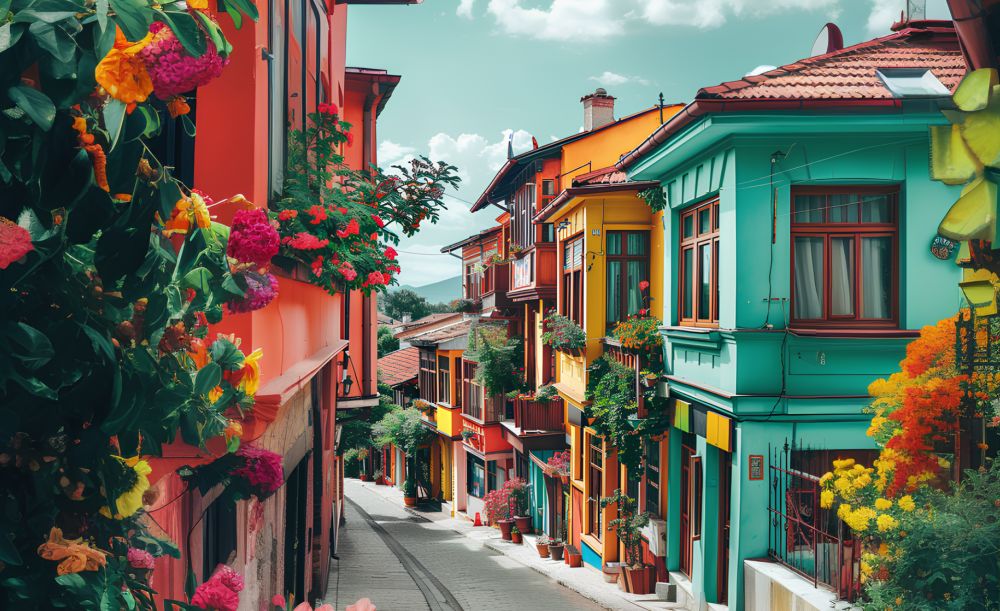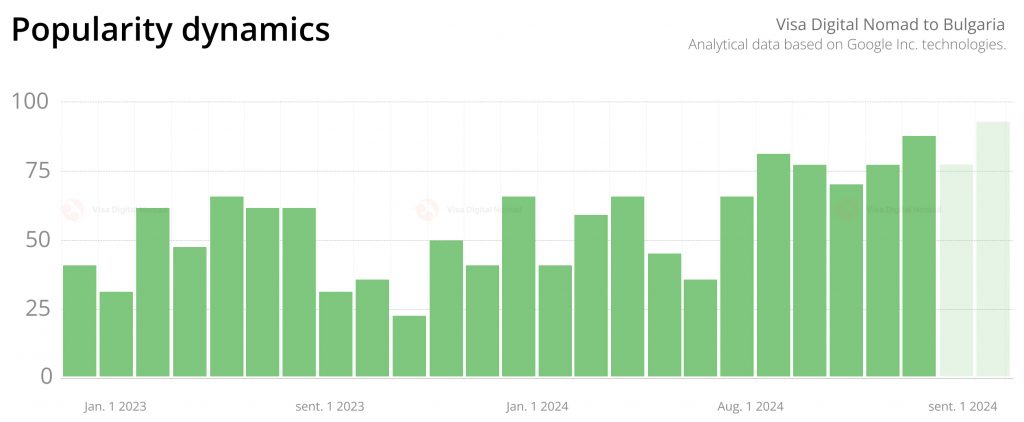Bulgaria is one of the EU countries that was partially included in the Schengen area jurisdiction in April 2024. Under these new conditions, the prospect of moving to this Balkan state is becoming increasingly attractive for a large number of foreigners working as self-employed. However, a digital nomad visa is not yet legislated in Bulgaria.
Russians can legally reside and work remotely on the territory of the Bulgarian state through an alternative program. Initially, it is necessary to obtain a permit for individual labor activity (ILA), and then a long-term category “D” visa must be arranged. The national visa application processing time does not exceed 35 working days.
Freelance Visa Specifics
The analog digital nomad program allows a foreign guest to engage in private practice without the need to register as a sole proprietor. This program is predominantly chosen by bloggers, IT specialists, business consultants, and anyone who prefers to be self-employed. The ILA permit, designated for the self-employed, allows them to register their own company within the territory of the Balkan state and to officially be its founder.
However, it is important to remember the restrictions that prevent a foreigner from obtaining a private practice permit. These restrictions apply to professions primarily occupied by specialists with a Bulgarian passport (lawyers, notaries). For Russians wishing to obtain an ILA permit, an exam in the national language is required (qualification level must be at least B1). Additional requirements include presenting a business project plan and justifying its benefit to the national economy and local population. Another condition for those planning to participate in the analog digital nomad visa program is the official confirmation of professional competencies and experience.
After obtaining the private practice permit, one can proceed to apply for a category D visa (considered equivalent to a residence permit). The visa is issued by the Bulgarian embassy (Moscow, Mosfilmovskaya Street, 66). With a freelancer’s residence permit stamp in the passport, one can freely cross the border of the Balkan state. Upon arrival in Bulgaria, the entrepreneur must register with the agency responsible for maintaining the entrepreneur statistics. Then, the participant of the analog digital nomad visa program may apply to the Migration Department to obtain a document allowing long-term stay in the country.
Taxes for Freelancers
The tax rate for foreigners engaged in private practice in Bulgaria is 10% of the monthly income. Participants in the analog freelancer visa program are also required to contribute to social programs, while self-employed are not charged health insurance contributions. A foreigner owning a company with one founder pays a corporate tax of 10% of the profit (no fiscal payment is required if there is no profit).
Tax rates for various categories of remote workers
| Tax name | The amount of tax | Note |
| Income tax (personal income tax) | 10% | Fixed rate for residents, charged on income after deduction of expenses |
| Corporate tax (for EDI) | 10% | Is charged only on the company’s profits. If there is no profit, no tax is paid. |
| Tax on dividends | 5% | When distributing profits from the company to the owner. |
| Social contributions | Depends on income | Mandatory for the self-employed. They can reach 20% of the income. |
| Contributions to the compulsory health insurance system | Depends on income | Required only for persons with permanent residence or permanent residence |
| Patent tax for sole proprietors | Depends on activity | For individual entrepreneurs (ET) |
| Alternative tax for sole proprietors | 15% | It is applied instead of the patent tax depending on the type of activity |
Visa Costs
The consular fee for issuing a national visa with a validity of up to 1 year is 200 euros. Services for processing documents at the visa center additionally cost 14 euros. Visa and service fees are not charged for children (under 6 years old) and disabled individuals of all groups (including one accompanying person).

- We will answer all your questions
- We will help you choose the best option
- We will guide you through every step or do everything for you
Required Documents
To apply for an ILA permit, a potential participant in the digital nomad visa analog program must provide:
- A business project plan;
- A document confirming professional qualification and work experience (diploma, work book, etc.);
- A certificate of knowledge of the Bulgarian language;
- A document proving financial security (bank statement with a deposit no less than 6 MROT, established in the Balkan state).
For a long-term visa application, the applicant needs:
- Application form;
- Permission to engage in private practice (certified copy);
- Documents confirming rental accommodation;
- A 3.5 x 4.5 cm color photo (1 copy);
- International passport;
- Document of financial security (bank statement with a deposit no less than 6 MROT, established in Bulgaria);
- Civil passport;
- Medical insurance with a coverage amount of at least 30,000 euros;
- Certificate of no criminal record;
- Consent for the processing of personal data.
To apply for entry permission into Bulgaria, one should contact VFS Global visa centers (applications are submitted by appointment online – website https://visa.vfsglobal.com/rus/ru/bgr/news/application-for-long-term-visa). Accredited structure offices are located in Moscow, Saint Petersburg, Kazan, and Yekaterinburg.
Recent Changes in Visa Issues with Bulgaria
On April 17, 2025, the Bulgarian Parliament adopted in the first reading a number of amendments to the Law on Foreigners. Innovations are seriously changing the conditions of stay of foreign citizens in the country. The changes are taking place against the background of Bulgaria’s full integration into the Schengen area. In fact, they reflect the country’s new approach to migration control. Our experts have already analyzed the new requirements.
The main change concerned the terms of mandatory registration. Now all arrivals need to register their place of residence at the Department of the Ministry of Internal Affairs (MIA) within 3 days after entering the country. Compared to the previous order, this is a tightening. Previously, 5 days were allowed for registration. A fine of 200 to 2000 leva (~ 100 to 1000 euros) is provided for violation of the requirement.
The only exceptions are tourists arriving in organized groups. They are registered by the host hotels or tour operators. These measures are related to strengthening the fight against illegal migration. On April 16-17, 2025 alone, 13 people were detained during a police operation in Sofia, six of whom were for illegal residence in the country.
An analysis of the graph using Google Trends open data shows that in recent months there has been a clear increase in requests for a digital nomad visa to Bulgaria. It is also important to note that this program is one of the few that did not lose demand at the beginning of summer 2024.
Frequently Asked Questions
The procedure includes 3 key steps. Obtaining a type D visa – preparation of documents (translations, apostille, notary services) costs 200-400 €, including a state fee of 60-80€. Obtaining a permit for ETC. requires paying for an exam in Bulgarian (100-150 €), drawing up a business plan (300-500€) and a state fee of 50-100€. Applying for a residence permit – the cost ranges from 100€ for a semi-annual status to 250€ for a one-year one, plus medical insurance costs (105-500€).
When applying, you must apply for a medical insurance policy with a cost of approximately 100-200 €. The insurance must cover the entire period of stay in Bulgaria and comply with EU standards. The minimum cost of the basic package is 105€ per year, extended coverage with the inclusion of dentistry and emergency evacuation reaches 500-1,000€. When the status is extended, the insurance must be renewed, which adds 80-200€ annually.
The health insurance policy must cover the entire period of the requested stay with a margin of 30 days. When applying for a one-year visa, the minimum insurance period is 13 months. Renewal of insurance coverage is required at each renewal of residency status.
Yes, it is required. The certificate must be issued within 30 days. The certificate must be provided from all countries where the applicant has resided for more than one year.
Yes, a certificate of knowledge of the Bulgarian language at least B1 is required to obtain a permit for etc.
The business plan should clearly demonstrate the benefits of the project for the Bulgarian economy, contain a detailed description of the activities, and confirm that the main activity will not compete with local specialists in the domestic labor market.
The process of applying for a national D visa takes 20-35 working days from the moment of submitting the full package of documents to the consular institution. The time frame may be extended if additional inspections are necessary or if there is high seasonal demand. It is important to keep in mind that the preparatory stage of collecting documents (attesting translations, obtaining certificates) usually takes 2-4 weeks before the official submission.
An individual work permit is issued within 30 working days after the application is registered with the Ministry of Labor. The procedure includes a professional qualification check, a business plan analysis, and a language exam. An expedited procedure (15 business days) is available for an additional fee of 50% of the base fee.
In addition to the language exam (100-150€), applicants pay an administrative fee (50€), registration of a business project (150-300€), legal support (200-500€).
After entry with a type D visa, the application for a residence permit is made through the local migration services. The standard review period is 7-30 calendar days. If additional documents are requested, the process may take up to 60 days. A residence permit card is issued 10-15 business days after the application is approved.
The main cost items are: state duty (€5 for reviewing the application), production of a residence permit card – from € 22 (monthly waiting) to € 110 (3 days), confirmation of housing – rent for a year requires a deposit of 1-2 monthly payments (on average 400-800€ in Sofia).
The application for renewal must be submitted no later than 15 calendar days before the expiration of the current permit. Violation of this deadline will result in a fine of €25 for each day of delay.
The state fee for the extension of a residence permit is 100€ for 6 months or 250€ for a year. If the submission of documents is delayed by more than 15 days before the deadline, a fine of € 25 will be charged for each day of delay. Additionally, you will need to update your insurance (+80-200 €) and provide fresh income statements (20€ for a bank statement).
Apostilling and translating papers requires 5-7 business days for each document.
Each document requires apostillation (20€ per page), translation into Bulgarian (10-15€ per page), notarization (20-50€ depending on the type of document). For example, the certification of a rental agreement will cost 30-40€, and a certificate of non–criminal record will cost 25€.
Non-obvious costs include: legal consultations (50-150€/hour), Bulgarian language courses (300-600€ to reach the B1 level), document forwarding (50-100€ when using courier services). For property owners, annual taxes are added – 0.1-0.3% of the cadastral value.
Obtaining status through a digital nomad visa is not possible directly. The Digital Nomad Visa in Bulgaria does not yet have an official legal basis (leading to naturalization). However, foreigners can work remotely and reside in the country by applying for a type D national visa. This permit allows you to obtain a temporary residence permit (residence permit), which can be extended, but does not in itself lead to citizenship.













